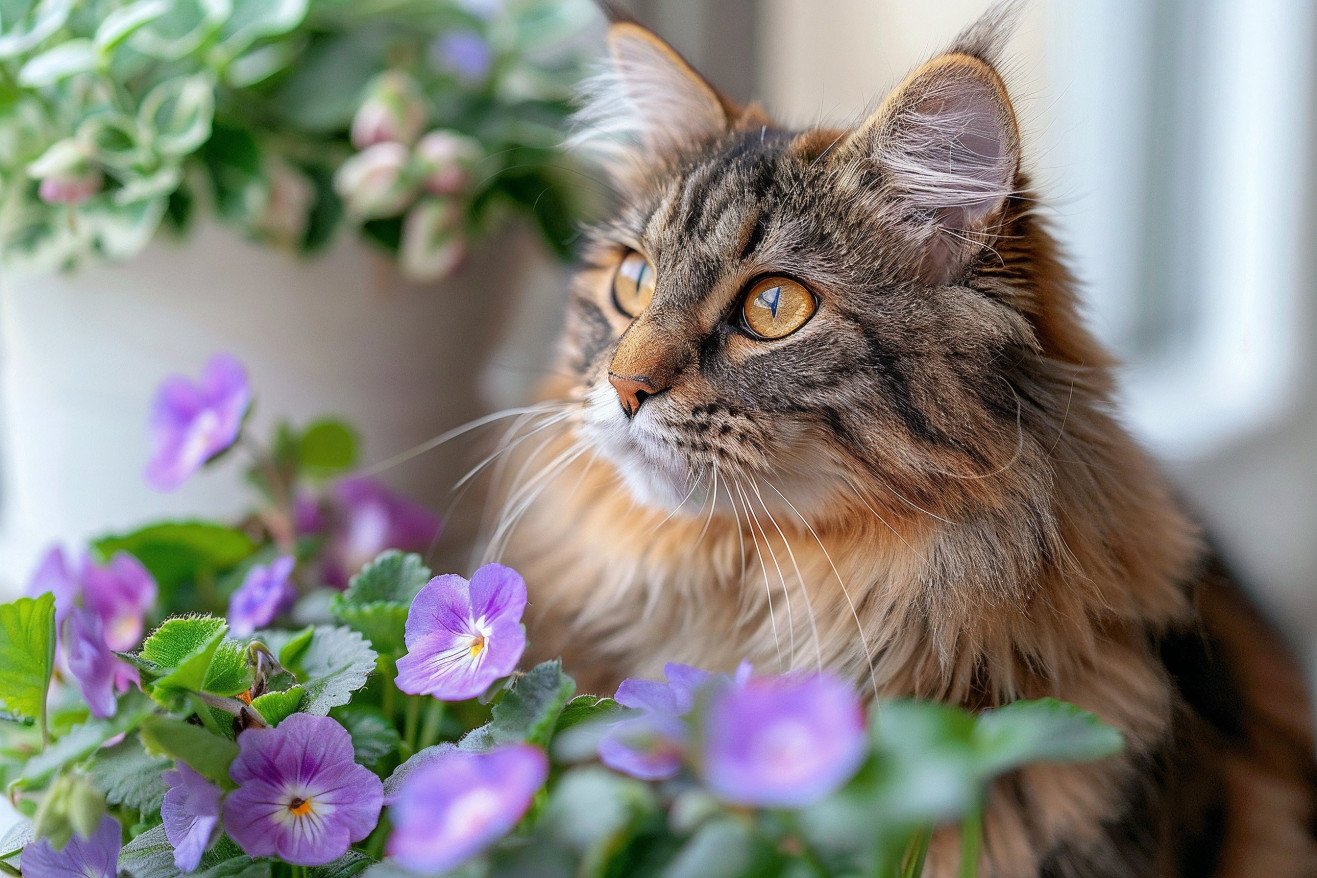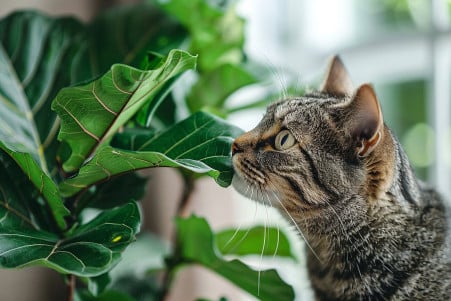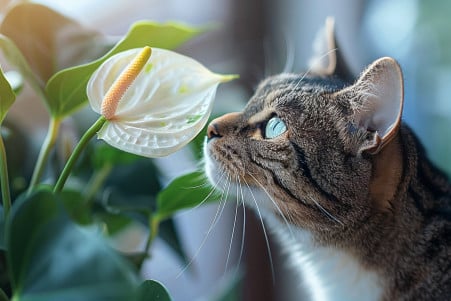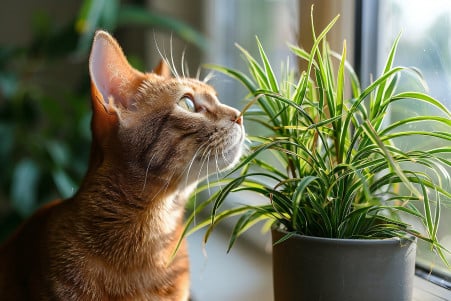Can Cats Eat African Violets? What You Need to Know
20 March 2024 • Updated 20 March 2024

If you own a cat and have African violets in your home, you may be concerned about the possibility of your pet eating them. While African violets are not toxic to cats, they can cause some gastrointestinal upset if they are ingested. That said, the plant's fuzzy leaves can cause irritation in the intestines, so it's best to keep them away from your pets.
In this article, we will take a deep dive into the most up-to-date, credible information from veterinary professionals, horticulturists, and toxicology studies to determine the risks that African violets may pose to cats. By looking at the compounds in the plants and how they affect cats of different ages and breeds, we will be able to determine the best practices for keeping African violets in a home with cats. This evidence-based approach will help you make informed decisions that will keep your pets safe and healthy.
Are African violets poisonous to cats?
Symptoms and Treatment of Plant Ingestion
If your cat has eaten part of an African violet, it's important to take action right away. General signs of plant poisoning in cats include vomiting, diarrhea, and lethargy, according to the veterinary professionals at EthosVet. Meanwhile, more serious symptoms can include drooling, seizures, difficulty breathing, and abnormal heart rhythms, according to Cooper Pet Care.
If you think your cat has eaten an African violet, start by removing any remaining plant material from their mouth. Then, put your cat in a safe space and call a pet poison control hotline or your vet immediately, according to this Q&A on JustAnswer. Your vet may recommend treatments like vomiting, activated charcoal to absorb toxins, or IV fluids based on the severity of the situation.
Even though African violets are non-toxic, any plant can cause gastrointestinal upset if it's eaten in large enough quantities. However, if you act quickly and follow the advice of professionals, you can reduce the danger and make sure your cat gets the care they need. Of course, the best way to prevent a problem is to keep these lovely plants out of your cat's reach.
How to Protect African Violets From Cats
If you want to protect your African violets from cats, there are several things you can do. According to Greg.app, one of the best ways to keep cats away from your plants is to put them in a place that cats can't reach, like on a high shelf or in a room that cats can't access. You can also use physical barriers like plant stands or hanging baskets to keep your cats away from your violets.
Another way to keep cats from eating your African violets is to provide them with alternative plants to chew on, like cat grass or catnip. This will help keep them from eating your violets, as suggested by the Litter-Robot blog. You can also make sure that your cat's litter box is clean and that they're getting plenty of playtime so that they're less likely to get bored and start exploring your plants.
If you notice that your cats are damaging your plants, Real Simple notes that you can try pet-safe repellents, but you should only use them as a last resort. Instead, focus on keeping your cats away from your plants by placing them in the right location and providing them with plenty of environmental enrichment.
By following these tips, you can make sure that your cats stay away from your African violets and that you can enjoy them in your home without worrying about your cats' safety.
African Violets and Air Quality
African violets can have a number of positive impacts on air quality. According to the Nebraska Extension in Lancaster County, African violets can increase humidity when placed in groups or on a pebble tray. This can help reduce the transmission of some viruses and improve respiratory health.
In addition, a study in Frontiers in Molecular Biosciences showed that African violets produce hydrogen peroxide during photosynthesis. This can help inactivate viruses and other pathogens in the air, potentially protecting against illnesses like COVID-19. The researchers concluded that "indoor plants could contribute to deactivation of pathogenic bacteria and viruses, such as airborne Covid-19 in homes and workplaces."
In addition to their air-purifying benefits, African violets are also easy to care for and can bloom all year long, adding beauty and color to your home. With their air-purifying benefits and their beauty, these plants are a great addition to any home, especially if you have a cat.
How to Care for African Violets If You Have Cats
Of course, to ensure that your African violets continue to grow and thrive in a cat-friendly environment, you'll also need to make sure you're providing the best care for your plants. According to the University of Florida IFAS Extension, African violets should be planted in a well-draining, soil-less potting mix designed specifically for their use. They also recommend bottom watering and letting the soil dry out a bit between waterings.
African violets prefer bright, indirect light, although Apartment Therapy explains that if you don't have enough natural light in your home, you can use a grow light to supplement it. Meanwhile, regular fertilization with a balanced, water-soluble fertilizer during the growing season will help ensure that your plants grow well and produce lots of flowers.
Meanwhile, to keep your plant looking its best, House of Hawthornes recommends repotting your African violets once a year and deadheading them. These simple steps, along with making sure your plants are in a safe location where your cats can't reach them, will help ensure that your African violets continue to thrive in your home for years to come.
Conclusion: Can You Keep African Violets in a Home With Cats?
African violets are generally non-toxic and safe for homes with cats. According to the Catster guide, the African violet and other plants in the Gesneriaceae family are not known to be toxic to felines. The ASPCA also confirms that African violets are non-poisonous to cats.
That said, while cats may be drawn to the plants’ soft, fuzzy leaves, the African Violet Resource Center warns that overconsumption can lead to mild gastrointestinal issues in cats, such as vomiting or diarrhea. Still, the bigger concern is the potential presence of chemicals or fertilizers on the plants, which can be more toxic to cats if they consume them.
To prevent cats from eating your African violets, the ePlanters blog suggests placing the plants out of reach, using physical barriers, and offering alternative options, such as cat grass, to discourage cats from eating the plants.
By taking these steps, cat owners can enjoy the beauty and air-purifying benefits of African violets in their homes.


